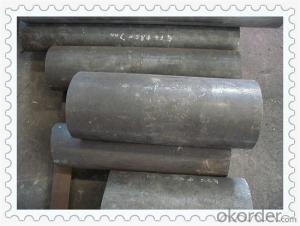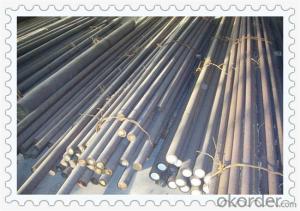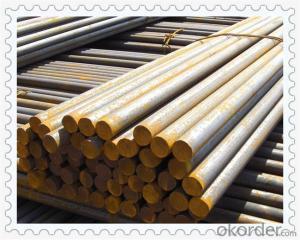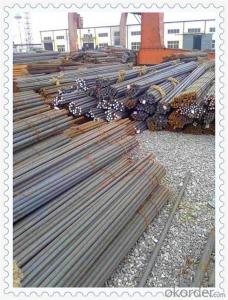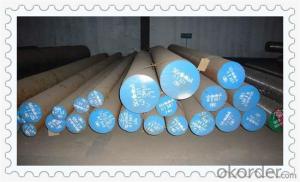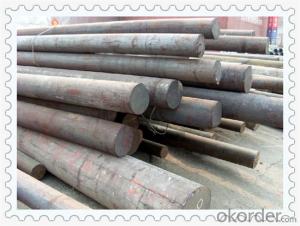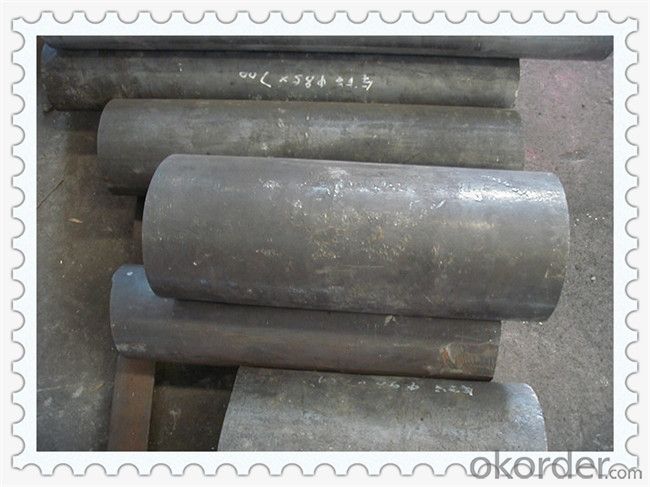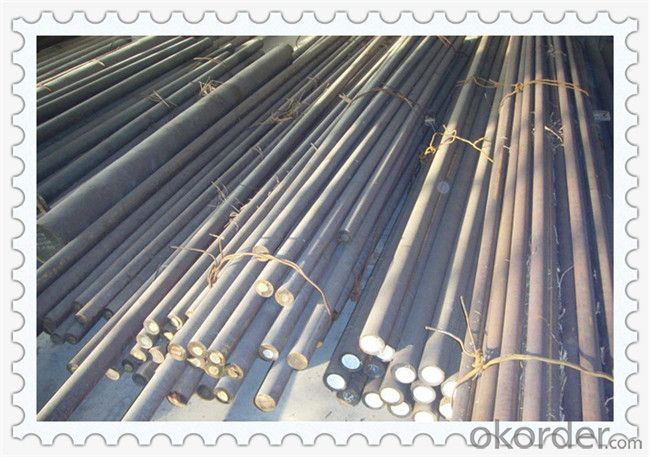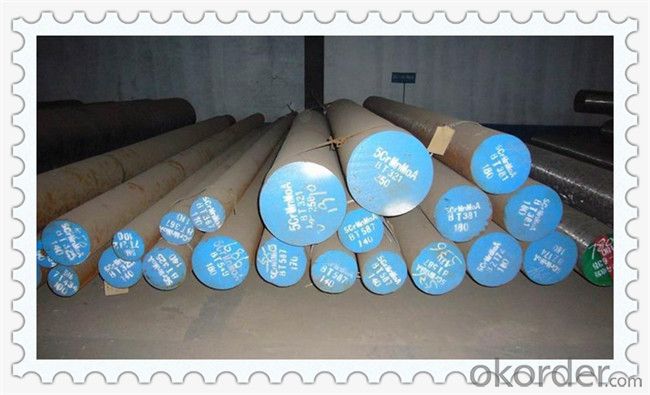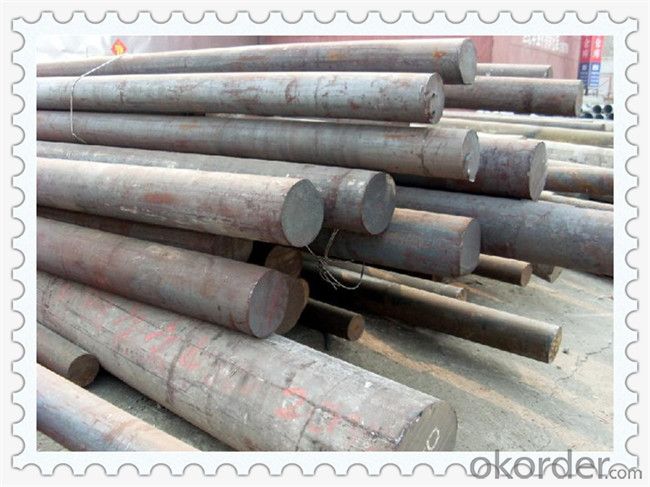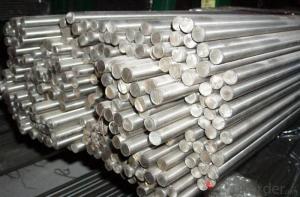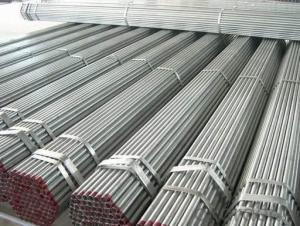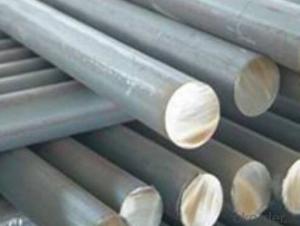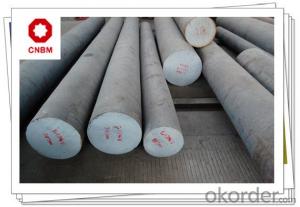Carbon Alloy Steel Round Bars AISI 4140
- Loading Port:
- China main port
- Payment Terms:
- TT OR LC
- Min Order Qty:
- 30 m.t.
- Supply Capability:
- 10000 m.t./month
OKorder Service Pledge
OKorder Financial Service
You Might Also Like
Carbon Alloy Steel Round Bars AISI 4140
Technical Paramenters
Chemical Composition | Mechanical Properties (In Quenched & Tempered State) | ||
C | 0.38-0.43 % | Tensile strength(MPA) | ≥1080(110) |
Si | 0.15-0.35% | Yield strength (MPA) | ≥930(95) |
Mn | 0.75-1.00 % | Elongation (δ5/%) | ≥12 |
Cr | 0.80-1.10 % | Reduction in Area (ψ/%) | ≥45 |
Ni | ≤0.030 % | Impact (J) | ≥ 63 |
P | ≤0.030 % | Impact toughness value αkv (J/cm2) | ≥78(8) |
S | ≤0.040 % | Hardness | ≤217HB |
Cu | ≤0.030 % | ||
Mo | 0.15-0.25 % | ||
Products Show
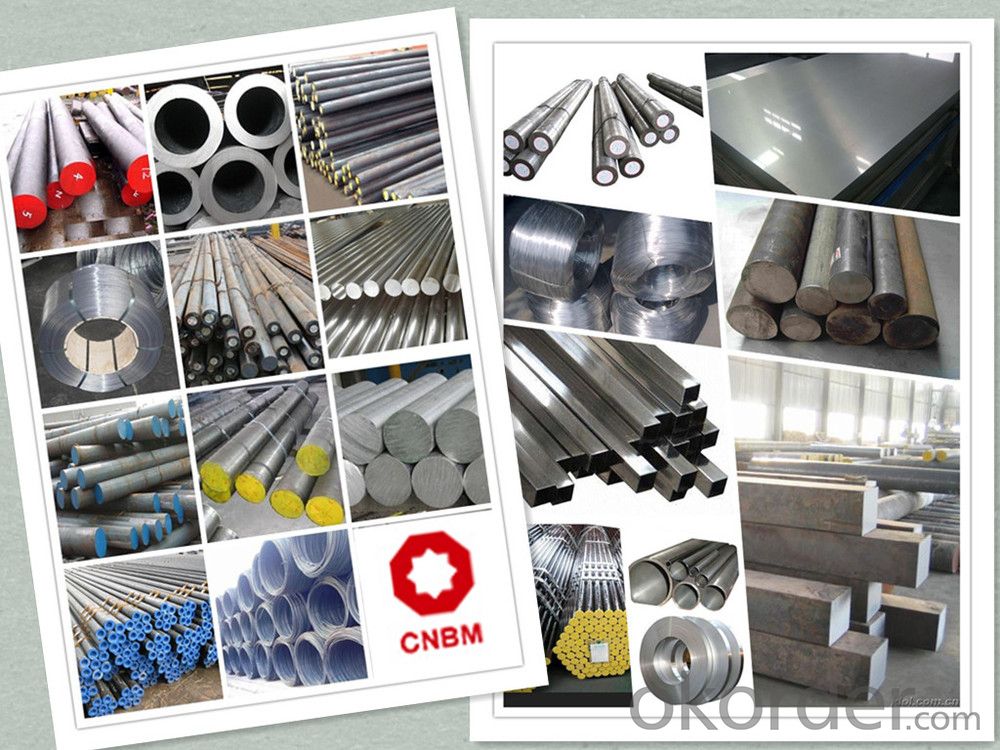
Standard Grades
Werkstoff-NO. | DIN-EN | DIN-Abbreviation | SAE/AISI |
1.1545 | 10096 | C 105 W1 | W110 |
1.1730 | 10096 | C 45 W | -- |
1.2063 | 10096 | 145Cr6 | - |
1.2067 | 10096 | 100Cr6 | L1/L3 |
1.2080 | 10096 | X210Cr12 | D3 |
1.2101 | 10096 | 62SiMnCr4 | - |
1.2210 | 10096 | 115CrV3 | L2 |
1.2363 | 10096 | X100CrMoV5 1 | A2 |
1.2379 | 10096 | X155CrVMo12 | D2 |
1.2419 | 10096 | 105WCr6 | - |
1.2436 | 10096 | X210CrW12 | D6 |
1.2510 | 10096 | 100MnCrW4 | O1 |
1.2542 | 10096 | 45 WCrV7 | S1 |
1.2550 | 10096 | 60WCrV7 | S1 |
1.2601 | 10096 | X165CrMoV 12 | - |
1.2721 | 10096 | 50 NiCr13 | - |
1.2826 | 10096 | 60MnSiCr4 | - |
1.2842 | 10096 | 90MnCrV8 | O2 |
Chemical Elements: | |||||||||||
Grade | C | Si | Mn | P≤ | S≤ | Cr | Mo | V | W | OTHER | |
1.2344/SKD61/H13 | 0.35-0.42 | 0.80-1.20 | 0.25-0.50 | 0.03 | 0.02 | 4.80-5.50 | 1.00-1.50 | 0.80-1.15 | Cu≤0.25 Ni≤0.25 | ||
4Cr5MoSiV1 | 0.32-0.42 | 0.80-1.20 | 0.20-0.50 | 0.030 | 0.030 | 4.75-5.50 | 1.10-1.75 | 0.80-1.20 | |||
1.2379/D2/SKD11 | 1.50-1.60 | 0.10-0.40 | 0.15-0.45 | 0.030 | 0.030 | 11.0-12.0 | 0.60-0.80 | 0.90-1.10 | |||
1.2510/O1/SKS3 | 0.85-1.0 | 0.10-0.50 | 1.0-1.40 | 0.030 | 0.030 | 4.75-5.50 | ≤0.30 | 0.4-0.6 | |||
1.2363/A2/SKD12 | 0.95-1.05 | 0.10-0.50 | 0.40-1.00 | 0.030 | 0.030 | 4.75-5.50 | 0.90-1040 | 0.15-0.50 | |||
4140 | 0.38-0.43 | 0.15-0.35 | 0.75-1.00 | 0.035 | 0.040 | 0.80-1.10 | 0.15-0.25 | ||||
4340 | 0.38-0.43 | 0.15-0.35 | 0.60-0.80 | 0.035 | 0.040 | 0.70-0.90 | 0.20-0.30 | Ni 1.65-2.00 | |||
P20/1.2330/M202 | 0.28-0.40 | 0.20-0.80 | 0.60-1.00 | 0.030 | 0.030 | 1.40-2.00 | 0.30-0.55 | ||||
Work Shop
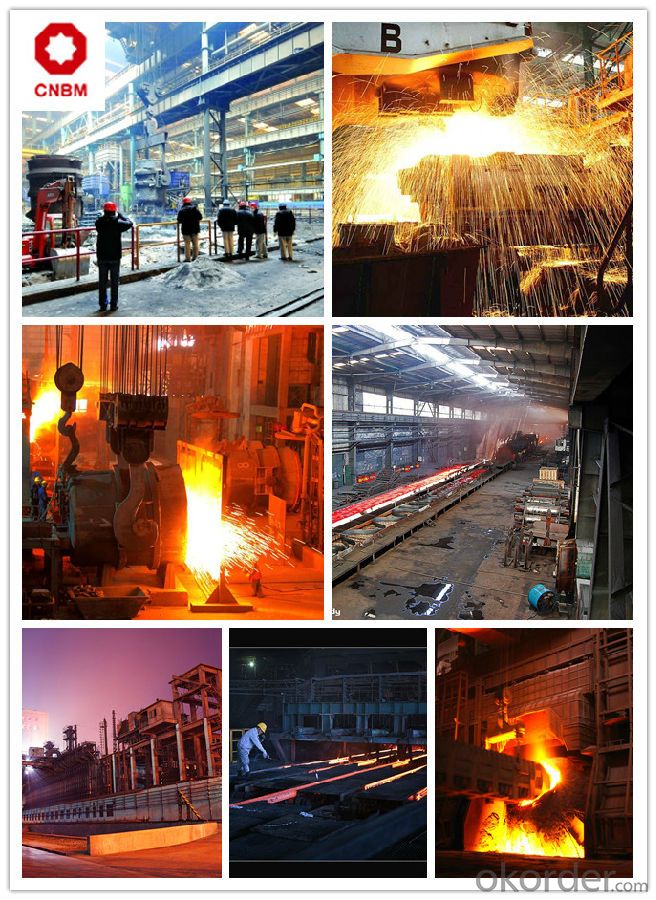
Company Information
CNBM International Corporation is the most important trading platform of CNBM group.
Whith its advantages, CNBM International are mainly concentrate on Cement, Glass, Iron and Steel, Ceramics industries and devotes herself for supplying high qulity series of refractories as well as technical consultancies and logistics solutions.

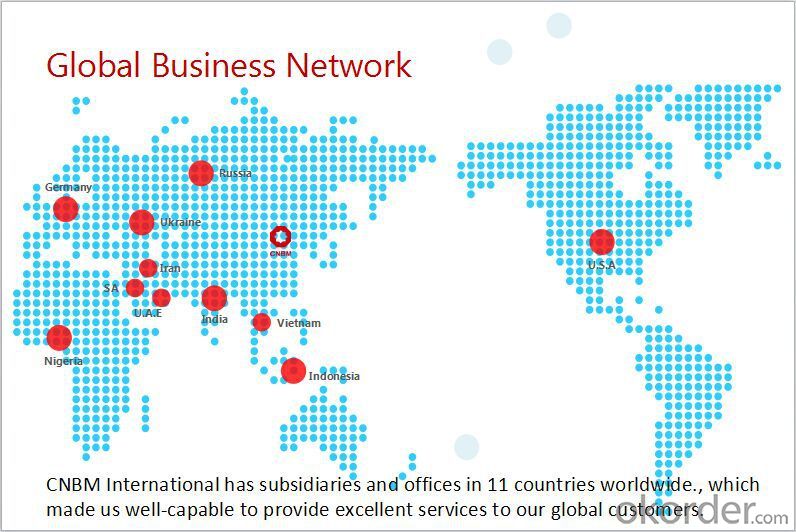
FAQ
1, Your advantages?
professional products inquiry, products knowledge train (for agents), smooth goods delivery, excellent customer solution proposale
2, Test & Certificate?
SGS test is available, customer inspection before shipping is welcome, third party inspection is no problem
3, Factory or Trading Company?
CNBM is a trading company but we have so many protocol factories and CNBM works as a trading department of these factories. Also CNBM is the holding company of many factories.
4, Payment Terms?
30% TT as deposit and 70% before delivery.
Irrevocable L/C at sight.
5, Trading Terms?
EXW, FOB, CIF, FFR, CNF
6, After-sale Service?
CNBM provides the services and support you need for every step of our cooperation. We're the business partner you can trust.
For any problem, please kindly contact us at any your convenient time.
We'll reply you in our first priority within 24 hours.
Packaging & Delivery
1, Packaging: seaworthy package or as required
2, Delivery: 35-45 days or based on quantity
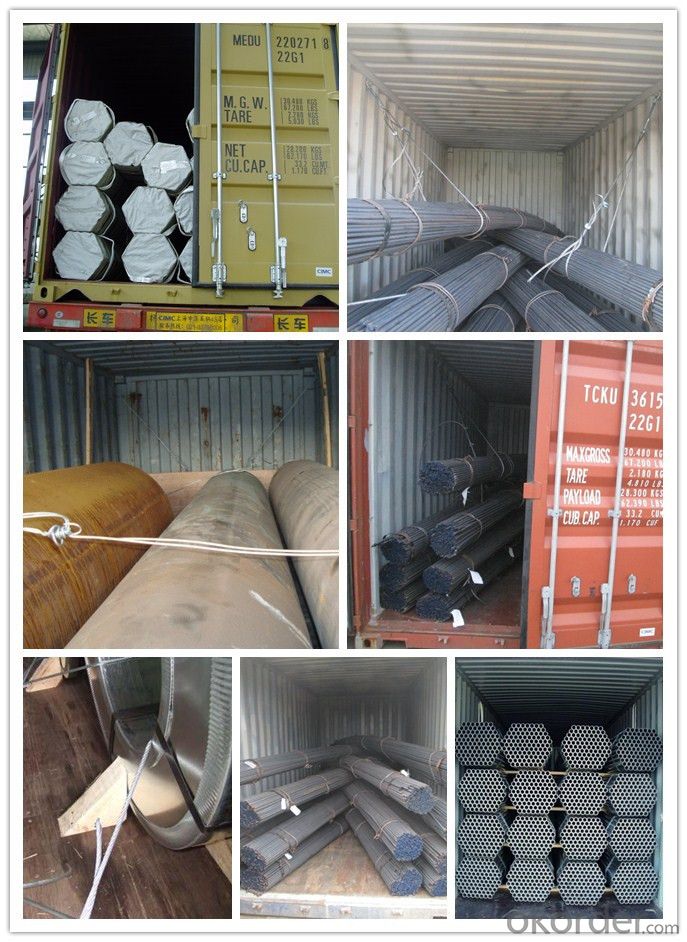
- Q: How are steel round bars stored and transported?
- Steel round bars are typically stored in warehouses or storage facilities. They are often stacked horizontally on racks or placed in designated storage areas. To prevent damage and ensure easy accessibility, bars of different sizes or grades are segregated and labeled accordingly. When it comes to transportation, steel round bars are commonly loaded onto flatbed trucks or shipping containers, depending on the quantity and distance of the shipment. To prevent movement and potential damage during transit, bars are secured using straps or other fastening methods. Additionally, protective coatings or wrapping materials may be applied to safeguard against corrosion or moisture. Overall, proper storage and transportation practices are crucial to maintain the quality and integrity of steel round bars.
- Q: What are the different types of connections used with steel round bars?
- Different types of connections are commonly used with steel round bars, depending on the specific application and structural requirements. Some examples of these connections include: 1. Welded Connections: Steel round bars can be fused together using heat and pressure in a process called welding. This method is widely used and results in a strong and durable connection. 2. Mechanical Connections: Bolts, nuts, or other mechanical fasteners can be employed to join steel round bars together. These connections are easy to install and can be disassembled if necessary, making them ideal for applications requiring frequent disassembly or reconfiguration. 3. Threaded Connections: By cutting threads into the ends of steel round bars, they can be screwed together using nuts. This type of connection offers good strength and can be easily tightened or loosened. 4. Adhesive Connections: High-strength adhesives or epoxies can be used to bond steel round bars together when welding or mechanical connections are not feasible or desirable. This method is commonly used in such situations. 5. Interlocking Connections: Specially designed couplers or connectors can be used to fit over the ends of steel round bars, creating a secure interlocking connection. These connections are often utilized in construction projects where quick and efficient installation is required. 6. Grouted Connections: The gaps between steel round bars can be filled with a cementitious grout material to enhance strength and stability. Grouted connections are commonly used in applications that require high load capacities. To ensure the correct type of connection is chosen for steel round bars, it is crucial to consider factors such as load capacity, installation ease, disassembly requirements, and structural integrity. Consulting with a structural engineer or a professional in the field is recommended.
- Q: Can steel round bars be plated with other metals?
- Steel round bars can indeed be plated with other metals, a process known as plating. Plating involves applying a thin layer of one metal onto the surface of another metal. This is commonly done to enhance the appearance of the steel round bar or to provide it with additional properties like corrosion resistance or improved conductivity. To plate the steel round bar, it is immersed in a solution containing ions of the desired metal. These metal ions are then deposited onto the surface of the steel through the use of electrical currents or chemical reactions, resulting in a thin and even coating. Nickel, chrome, zinc, and copper are among the popular metals used for plating steel round bars. Plating is a versatile and cost-effective technique for enhancing the performance and aesthetics of steel round bars in various applications.
- Q: What is the difference between a cold-drawn and a centerless ground steel round bar?
- Both cold-drawn and centerless ground steel round bars are distinct types of steel bars that have undergone different manufacturing processes, leading to varied characteristics and properties. To produce cold-drawn steel round bars, a hot-rolled or annealed steel bar is pulled through a die, decreasing its diameter and increasing its length. This procedure enhances the steel's mechanical properties, making it stronger, more precise in dimensions, and possessing a smoother surface finish. Cold-drawn bars exhibit superior tensile strength, improved surface finish, and tighter dimensional tolerances compared to hot-rolled bars. They are frequently employed in applications that necessitate precision and strength, such as automotive components, machinery parts, and construction materials. On the contrary, centerless ground steel round bars are created by passing a cylindrical steel bar through a grinding machine without the need for centers or support. This grinding process eliminates surface imperfections and deviations in diameter, resulting in a precise and smooth finish. Centerless ground bars offer exceptional dimensional accuracy, surface finish, and roundness. They are commonly utilized in applications where precision and tight tolerances are crucial, such as in the production of bearings, shafts, and hydraulic cylinders. In conclusion, the primary distinction between a cold-drawn steel round bar and a centerless ground steel round bar lies in the manufacturing process and the resultant properties. Cold-drawn bars are formed by pulling the steel through a die, leading to enhanced mechanical properties, tighter tolerances, and a smoother surface finish. Centerless ground bars are produced by grinding the steel to enhance dimensional accuracy, roundness, and surface finish. Both types of bars possess their own advantages and are suitable for different applications based on the required precision, strength, and surface finish.
- Q: What are the common sizes of steel round bars?
- The common sizes of steel round bars vary, but some frequently used diameters range from 1/4 inch to 12 inches.
- Q: What are the different surface treatments available for stainless steel round bars?
- There are various surface treatments available for stainless steel round bars, including pickling, passivation, polishing, and coating.
- Q: Can steel round bars be used for hydraulic applications?
- Yes, steel round bars can be used for hydraulic applications. Steel is known for its strength and durability, making it a suitable material for hydraulic systems that require high pressure and heavy loads. Steel round bars can be used to manufacture various hydraulic components such as cylinders, pistons, shafts, and valves. The hardness and corrosion resistance of steel also make it a reliable choice for hydraulic applications where the fluid may contain contaminants or have high temperatures. However, it is important to consider the specific requirements of the hydraulic application and select the appropriate grade and type of steel round bars to ensure optimal performance and longevity.
- Q: What are the different types of steel round bars used in the manufacturing of shafts?
- There are several types of steel round bars used in the manufacturing of shafts, including carbon steel, alloy steel, stainless steel, and tool steel. Each type has its own unique properties and characteristics that make it suitable for specific applications. For instance, carbon steel round bars are commonly used for general-purpose shafts due to their high strength and affordability. Alloy steel round bars, on the other hand, are preferred for applications that require enhanced strength, hardness, and durability. Stainless steel round bars are used when corrosion resistance is a priority, making them ideal for shafts in industries like food processing or marine environments. Finally, tool steel round bars are chosen for their exceptional hardness, wear resistance, and ability to withstand high temperatures, making them suitable for shafts used in cutting tools or machinery. The selection of the appropriate type of steel round bar depends on the specific requirements and conditions of the shaft's application.
- Q: What are the different types of steel round bars used in the automotive braking systems?
- Automotive braking systems rely on various types of steel round bars that possess specific properties for optimal performance. These steel variants are carefully selected for their strength, durability, and ability to withstand the intense temperatures and pressures that arise during braking. One commonly utilized steel round bar is carbon steel, renowned for its exceptional hardness and high strength. Brake rotors and drums often incorporate carbon steel round bars due to their ability to endure the heat and friction generated during braking, ensuring reliable and long-lasting performance. Stainless steel represents another steel round bar employed in automotive braking systems. Its resistance to corrosion and rust make it an ideal choice for brake lines and fittings. Additionally, stainless steel boasts excellent heat resistance properties, enabling it to endure the thermal stresses generated during braking. Furthermore, alloy steel round bars find application in automotive braking systems. Combining various metals like chromium, nickel, and molybdenum, alloy steel enhances its mechanical properties. Known for their remarkable tensile strength and toughness, alloy steel round bars suit demanding applications that require superior performance and durability. Specialized types of steel round bars also exist, designed specifically for particular applications within automotive braking systems. For instance, heat-treated steel round bars are employed in the manufacturing of brake calipers and pistons due to their capability to withstand the extreme temperatures resulting from the friction between brake pads and rotors. In summary, the selection of steel round bars in automotive braking systems hinges upon specific requirements, encompassing strength, durability, heat resistance, and corrosion resistance. By carefully choosing the appropriate steel variant, automotive manufacturers can guarantee the safety and reliability of their braking systems.
- Q: What are the advantages of using chromium-alloy steel round bars?
- There are several advantages to using chromium-alloy steel round bars. Firstly, the presence of chromium in the alloy significantly enhances the corrosion resistance of the steel, making it ideal for applications in harsh environments or exposed to corrosive substances. Additionally, chromium-alloy steel round bars offer excellent strength and hardness, making them suitable for heavy-duty applications that require high load-bearing capacity. The inclusion of chromium also improves the steel's heat resistance, allowing it to withstand high temperatures without losing its structural integrity. Lastly, chromium-alloy steel round bars are known for their excellent wear resistance, making them a reliable choice for industries such as automotive, construction, and manufacturing.
Send your message to us
Carbon Alloy Steel Round Bars AISI 4140
- Loading Port:
- China main port
- Payment Terms:
- TT OR LC
- Min Order Qty:
- 30 m.t.
- Supply Capability:
- 10000 m.t./month
OKorder Service Pledge
OKorder Financial Service
Similar products
Hot products
Hot Searches
Related keywords
